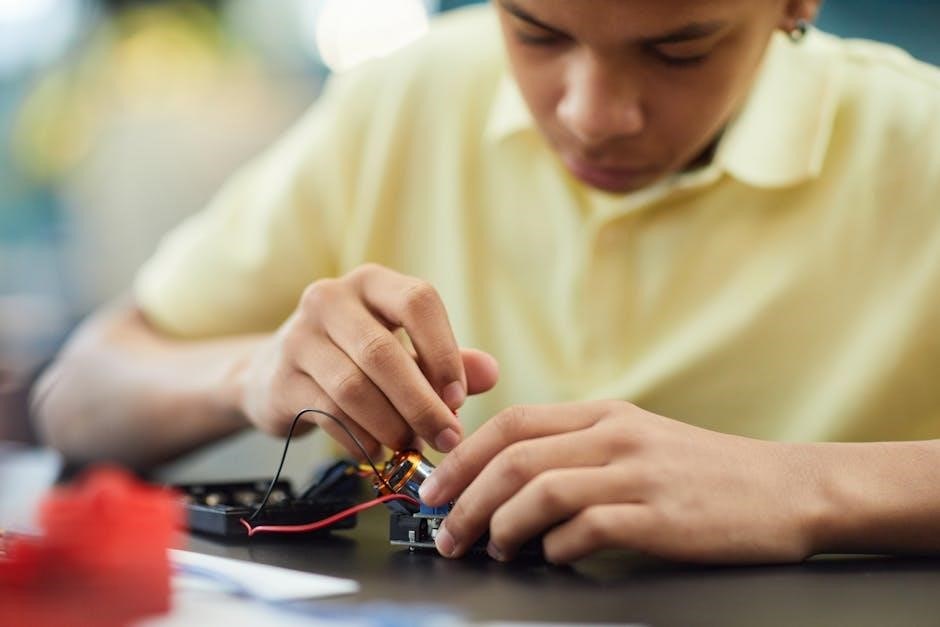The 7 Habits of Highly Effective Teens is a life-changing guide tailored for teenagers, offering practical advice to navigate the challenges of adolescence․ Adapted from Stephen Covey’s timeless principles, this book provides a clear roadmap for self-improvement, helping teens build self-esteem, strengthen relationships, and make wise decisions․ It equips young people with effective strategies to thrive in all areas of life, fostering a positive mindset and a strong foundation for future success․
About the Author, Sean Covey

Sean Covey is a renowned author, motivational speaker, and expert in personal development, particularly for teenagers․ As the son of Stephen Covey, who wrote the iconic The 7 Habits of Highly Effective People, Sean adapted these timeless principles for a younger audience in The 7 Habits of Highly Effective Teens․ His work has resonated with millions of teenagers worldwide, offering practical advice to navigate the challenges of adolescence․ Sean’s approach is rooted in empathy and understanding, making his guidance accessible and relatable․ Over 3 million copies of his book have been sold, solidifying its place as a trusted resource for teens and parents alike․ Sean’s mission is to empower young people to build self-esteem, strengthen relationships, and make wise decisions, equipping them with tools for long-term success․ His clarity, humor, and real-life examples have made him a beloved figure in the realm of youth development․

Importance of the Book for Teenagers
The 7 Habits of Highly Effective Teens is a transformative resource for teenagers, offering practical advice to navigate the challenges of adolescence․ It addresses common struggles such as peer pressure, school stress, and family relationships, providing teens with tools to build self-esteem and make wise decisions․ The book’s principles, like being proactive and thinking win-win, help teens develop a positive mindset and effective strategies for overcoming obstacles․ Its relatable examples and engaging tone make it accessible to young readers, fostering personal growth and resilience․ By focusing on personal responsibility and empathy, the book empowers teens to take control of their lives and shape their futures․ Over 3 million copies sold highlight its impact as a trusted guide for teenagers seeking to thrive in all areas of life․ This book is not just a guide—it’s a roadmap for success and fulfillment during the critical teenage years․
The 7 Habits Explained
The 7 Habits are timeless principles that guide teens toward effectiveness․ They include being proactive, beginning with the end in mind, putting first things first, thinking win-win, seeking to understand, synergizing, and sharpening the saw․ These habits collectively empower teens to take control of their lives, build strong relationships, and achieve their goals, fostering personal growth and success․
Habit 1: Be Proactive
Be Proactive is the foundation of personal effectiveness․ It teaches teens to take responsibility for their choices and actions, focusing on what they can control rather than blaming circumstances․ Proactive individuals recognize their “Circle of Influence” and act within it, avoiding reactive behavior․ This habit encourages self-awareness, accountability, and initiative, helping teens develop a mindset where they are the drivers of their own success․ By being proactive, they learn to respond thoughtfully rather than react impulsively, fostering resilience and confidence․ This habit is essential for building a strong sense of self and laying the groundwork for the other habits to flourish․ It empowers teens to take charge of their lives, making intentional decisions that align with their values and goals․
Habit 2: Begin with the End in Mind
Begin with the End in Mind encourages teens to establish a clear vision for their future․ This habit emphasizes the importance of setting long-term goals and creating a personal mission statement to guide decision-making․ By focusing on what they want to achieve in life, teens can prioritize their actions and make choices that align with their values․ This habit helps them think critically about their legacy and how they want to be remembered, fostering a sense of purpose and direction․ It teaches the value of self-awareness and the power of having a roadmap for life, ensuring that daily decisions contribute to larger, meaningful objectives․ This proactive approach to life helps teens stay focused, motivated, and committed to their aspirations, ultimately leading to a more fulfilling and purpose-driven life;
Habit 3: Put First Things First
Put First Things First focuses on effective time management and prioritization․ This habit teaches teens to distinguish between urgent and important tasks, helping them avoid procrastination and stay focused on what truly matters․ By using a time management matrix, teens can categorize activities into four quadrants: urgent and important, important but not urgent, urgent but not important, and neither urgent nor important․ This tool enables them to allocate their time wisely, ensuring they concentrate on meaningful goals and reduce stress․ Habit 3 encourages teens to create a schedule that aligns with their personal mission statement, promoting productivity and balance․ By mastering this habit, teens can achieve their objectives without getting overwhelmed, fostering a sense of accomplishment and control over their lives․ This practical approach to time management is essential for building discipline and laying the groundwork for long-term success․
Habit 4: Think Win-Win
Think Win-Win is about fostering positive relationships by seeking mutual benefit in all interactions․ This habit encourages teens to adopt an abundance mentality, believing there is enough success to go around․ Instead of focusing on winning at the expense of others, teens learn to collaborate and find solutions where everyone gains․ This approach builds trust, strengthens friendships, and creates a supportive environment․ By thinking win-win, teens develop empathy and learn to value others’ needs, leading to stronger, more meaningful relationships․ This habit also teaches teens to avoid win-lose situations, which can harm trust and damage connections․ By focusing on mutual success, teens can build a reputation as someone who is fair, reliable, and caring․ This mindset not only benefits others but also contributes to the teen’s own long-term success and happiness․ Mastering this habit helps teens become better friends, family members, and community contributors․
Habit 5: Seek First to Understand, Then to be Understood
Seek First to Understand, Then to be Understood emphasizes the importance of empathy and effective communication․ This habit teaches teens to listen deeply before expressing their own thoughts, ensuring they truly comprehend others’ perspectives․ By doing so, teens build stronger relationships and resolve conflicts more effectively․ Active listening is a key component, as it shows respect and fosters trust․ This habit encourages teens to move beyond their own views and consider others’ feelings and needs․ It also helps them communicate more clearly and avoid misunderstandings․ Mastering this habit enables teens to become better friends, family members, and teammates․ It promotes a culture of understanding and empathy, which is essential for personal growth and building strong connections․ By prioritizing understanding, teens can express themselves more effectively and create meaningful, lasting relationships․ This habit is a powerful tool for navigating the complexities of teenage social dynamics․
Habit 6: Synergize
Synergize is about combining the strengths of individuals to achieve something greater than the sum of their parts․ It encourages teens to value diverse perspectives and work collaboratively to create innovative solutions․ This habit goes beyond mere cooperation; it’s about harnessing the power of teamwork to accomplish what one person cannot do alone․ By embracing synergy, teens learn to communicate effectively, respect differences, and build on each other’s ideas․ This habit is particularly useful in group projects, sports, and personal relationships․ It teaches teens that when they seek win-win solutions and combine their efforts, they can overcome challenges more effectively․ Synergy fosters creativity, strengthens bonds, and helps teens grow both personally and collectively․ It’s a powerful reminder that together, people can achieve far more than they can individually․ By practicing synergy, teens develop the skills to collaborate effectively and create meaningful results․ This habit is essential for building strong, lasting relationships and achieving shared goals․
Habit 7: Sharpen the Saw
Sharpen the Saw focuses on self-care and personal renewal, emphasizing the importance of maintaining a balance in life․ It encourages teens to prioritize their physical, emotional, mental, and spiritual well-being․ By regularly “sharpening the saw,” teens can recharge and build the resilience needed to handle life’s challenges effectively․ This habit reminds them that neglecting their own needs can lead to burnout and decreased effectiveness in other areas․ Through activities like exercise, reflection, and spending time with loved ones, teens can strengthen their foundation for long-term success․ Sharpening the Saw is not just about self-improvement; it’s about creating a sustainable lifestyle that supports growth and happiness․ By making self-care a habit, teens can maintain their energy and motivation, ensuring they’re always at their best․ This habit serves as the cornerstone for living the other six habits effectively and achieving a fulfilling life․

Practical Applications of the Habits
The 7 Habits offer practical tools for teens to apply in daily life, helping them manage time, build strong relationships, and make informed decisions․ These strategies foster personal growth and lasting success․
Creating a Personal Mission Statement
Creating a personal mission statement is a powerful tool from The 7 Habits of Highly Effective Teens that helps teenagers define their core values and long-term vision․ This statement serves as a roadmap, guiding decisions and actions to align with personal goals․ It encourages teens to reflect on what matters most to them, such as relationships, academics, or personal growth, and to articulate these priorities clearly․ By crafting a mission statement, teens develop a sense of purpose and direction, which helps them stay focused on what truly matters․ This habit fosters self-awareness and intentionality, empowering young people to live a life that reflects their values and aspirations․ A well-crafted mission statement becomes a foundation for making choices that lead to fulfillment and success, both now and in the future․
Time Management for Teenagers

Effective time management is a crucial skill for teenagers, and The 7 Habits of Highly Effective Teens provides practical strategies to master it․ Sean Covey introduces tools like the “Time Management Matrix,” which helps prioritize tasks based on urgency and importance․ By focusing on what truly matters, teens can reduce stress and increase productivity․ The book encourages setting clear goals, using planners, and avoiding procrastination․ It emphasizes the importance of balancing academics, extracurricular activities, and personal time․ By implementing these habits, teenagers can create a schedule that aligns with their priorities and supports their long-term vision․ This approach fosters a sense of control and confidence, enabling teens to manage their time wisely and achieve their goals without feeling overwhelmed․ The book also highlights the value of reflection and adjustment, ensuring that time is spent on activities that bring fulfillment and growth․
Building Strong Relationships
Building strong relationships is a cornerstone of personal and social success for teenagers․ Sean Covey’s The 7 Habits of Highly Effective Teens provides actionable advice to foster meaningful connections․ By practicing Habit 5, “Seek First to Understand, Then to be Understood,” teens learn to listen empathetically and communicate effectively․ This habit encourages open dialogue, helping teenagers navigate conflicts and build trust with family, friends, and peers․ The book also emphasizes Habit 4, “Think Win-Win,” which promotes mutual respect and cooperation in relationships․ By valuing others’ perspectives and seeking solutions that benefit everyone, teens can create lasting bonds․ Covey’s guidance helps young people develop emotional intelligence, empathy, and conflict-resolution skills, which are essential for maintaining healthy relationships․ These principles empower teenagers to connect deeply with others, fostering a supportive network that enriches their lives and helps them thrive in all areas․ Strong relationships are not just a goal but a foundation for long-term happiness and success․
